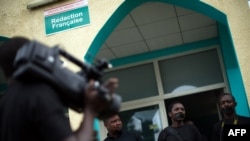Updated: July 17, 2019 3:55 PM.
NAIROBI/WASHINGTON — Press freedom advocates are coming down hard on Burundi, after increasing restrictions prompted the BBC to shut down its bureau in the central African country this week.
Burundian authorities have also suspended VOA from operating in the country since March and have threatened sanctions against Radio France International.
Reporters Without Borders wrote Wednesday that it is “extremely concerned about the fate of press freedom and pluralism in Burundi in the run-up to next year’s election.”
“How many independent media will be left when Burundi holds its presidential election in 2020?” the group asked.
Ernest Sagaga, the International Federation of Journalists’ head of human rights and safety, told VOA that the British broadcaster’s decision to close “shows that the BBC has now realized Burundi has no will to respect media freedom.”
Burundi’s government did not respond to calls from VOA for comment about the BBC decision.
BBC, VOA suspension
BBC Africa editor Will Ross said Tuesday that the service would shutter its Bujumbura bureau “until further notice” after talks with government authorities to restore its operations in the country failed to reach a breakthrough.
On March 29, Burundi’s National Communication Council indefinitely suspended the BBC and Voice of America (VOA) from operating on its territory. The government also prohibited anyone from supplying any form of information to the two international broadcasters.
The media regulator initially had imposed a six-month suspension on both news agencies in May 2018. It also forbade journalists in the country from contributing to either the BBC or VOA.
The council imposed those restrictions following the BBC’s 2018 release of an investigative documentary, “Inside the Secret Killing House,“ which alleged the Burundi government’s involvement in torturing and killing opposition members. The media regulator said the story was false and damaging to the national image.
Burundi also has accused VOA of employing a journalist who opposes the government. It said in a March 29 statement that Patrick Nduwimana, the former director of Bonesha FM Radio in Burundi, is “wanted for participating in deadly violence that preceded the May [2015] attempted coup.”
The Imbonerakure
Last week, the media regulatory body also warned Iwacu, a weekly newspaper, that it could be shut down over alleged bias and defamation. A journalist working for Iwacu has been missing since July 2016.
In another development, President Pierre Nkurunziza recently appointed the head of the ruling party’s youth wing, the Imbonerakure, to be head of the national broadcaster.
The Imbonerakure is regarded as a “militia” by the United Nations and is being investigated by the International Criminal Court on suspicion of crimes against humanity. It was used in the 2015 crackdown against opponents of the president’s decision to run for a third term, which critics said was unconstitutional.
